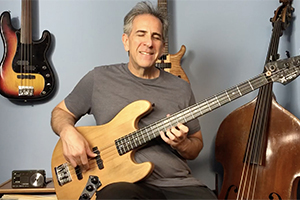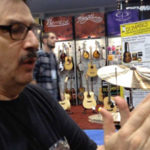Conflicting schools of thought on how to instill good time
By Jon Liebman
Week of October 21, 2019
What a hoot it was sitting down with Kajagoogoo bassist Nick Beggs at the London Bass Guitar Show, for an interview we published this week on FBPO. Nick is just one of those guys that naturally makes you smile, and is all but impossible not to like. The conversation covered bass technique, the Chapman Stick, gear, equipment, etc. Then Nick brought up a topic that, for some reason, tends to evoke controversy among musicians: practicing with a metronome.
Is a metronome a good thing, or a bad thing, as far as learning to keep solid time as a musician?
I’ve hammered this point home in some of my bass instruction books, insisting students use a metronome or a drum machine while practicing. Admittedly, though, I seldom find myself using my “Dr. Beat” anymore. On occasion, I’ll find myself playing along with a drum track (quantized to ultimate precision, of course), but most other times, it’s just me and the bass.
Is it because I’ve reached a certain level of musicianship, where I’ve now “got it” and no longer need the metronome? Is it laziness? Or do I just not feel like using it?
I mentioned in the interview how I’d gotten into some pretty animated exchanges with Jeff Berlin on the subject, always getting an earful from Jeff on how metronomes are not necessary and how, in fact, they might even do more harm than good.
Is that really true?
If I’m working on a rhythmically precise piece of music, like, say, Paganini’s “Moto Perpetuo” (“Perpetual Motion”) or “Flight of the Bumblebee,” both of which I shedded to death in my younger days, I could see a definite advantage to practicing with a metronome, as these pieces are made up almost exclusively of sixteenth notes. On the other hand, when laying down an R&B groove, or a blues shuffle, for example, I’m pretty confident in my ability to keep solid time.
While we’re at it, how about some of those early jazz records, with Charlie Parker, Dizzy Gillespie, Cannonball Adderley, and the other bebop stars? Have you ever noticed that the tempo at the end of a song was faster than where they’d kicked it off at the beginning? More importantly, did anyone complain?
Can a sense of time or a sense of rhythm be developed over time if a beginning music student doesn’t demonstrate these abilities early on? In my opinion, yes, which is a case for using a metronome to keep one’s playing “honest.” Beyond that, though, how important is it to use a metronome, as a general rule of thumb?
Have a thought on the subject? Leave a comment below. I’d love to know what you think. In the meantime, check out my interview with Nick here.




Hi Jon,
I think you posed some good questions. I say yes, a good sense of timing can be developed, just like relative pitch- but so can bad timing habits. I think beginners should practice with a time keeping device. For one example, groove time keeping aside, I have found that working with drummers many can rush through fills and come out ahead of the beat. If drummers can be guilty of it, so can we, especially as beginners and get into a bad habit. A time keeping device will help develop good habits and lessen the need in the future. Of course, that need may vary based on the individual.
There is a difference between good “time” and good “groove”. I know musicians who have great time (ie ability to maintain an even tempo), but no groove; I know guys who have it the other way around too. As far as I am concerned, the latter is preferred, though a well rounded/accomplished musician should have a good dose of both. I do think a metronome can teach good tempo keeping, but it cant teach good groove. I think good groove comes from lots of listening and playing, you cant teach it.
Centuries of classical musicians have used a metronome to learn precision in playing complex passages and rhythms, and I personally have used it for the same thing. In my jazz practice, I have used the metronome in various ways to guide my sense of time, mostly over long form. For example, set the metronome for one beat every 4 bars, and try to play a walking bass line while landing on the next click (4 bars later). I really fell this exercise was effective in my development; it’s just one example.
I find that Jeff Berlins comments sound a bit intentionally contrarian, as if the goal is to elicit controversy. Jeff speaks a lot in generalities, without providing much specificity for how/why a metronome is NOT an effective time teaching tool. I mean that on the level of the brain and how it learns, especially with respect to music (and rhythm). In a real academic setting, nobody would ever get to make the claims he makes without some serious research to back it up. How does a brain learn good meter without having some foundation for what good meter is (ie from a device or another musician, the latter of which is subjective)? Beyond the metronome, Jeff seems to dismiss a lot of other useful music learning ideas as wasteful, distilling everything down to just learning what he calls “academic content”, which really means some version of jazz/jazz harmony. The idea being that if you can learn and play jazz, you can learn and play most other styles, and this is true as far as the harmonic content goes. However, you cant be a good salsa bass player unless you immerse yourself in the style, meaning the rhythms, the idiomatic nuances, the harmonic and melodic ideas, etc. I think Jeff’s thing is you dont need a formal education for that kind of learning/information, which is true in a raw sense. However, if Oscar Stagnaro is teaching you how to play salsa, your learning of it will be informed and accelerated, while going at it on your own might be a fishing expedition.
I would tell any intermediate/beginner to use a metronome to develop good meter and to use it as a check against precision, while also listening to and playing with other musicians…. A LOT!!
Metronome is an essential practice tool. You’re in the RHYTHM SECTION. You have to have a level of confidence like a traffic cop. You (presumably) have to work with all sorts of drummers who will all have a slightly different feel, and may or may not have as good a sense of time as you do. When I was in college, we had a seminar with Count Basie. At one point, he was talking about time, and how to know when to keep it strict, and know when to slide it around. He started playing a song on the piano and had the whole class pat our hands with him. He then told us to keep it up, while he stepped out of the room. He was gone about two minutes, then came back and barked at all hundred and some music students, saying we had sped up. Quite a few barked right back, saying hell no, we’re all together, and all solid. At that point, he put on a sly grin and pulled the modern (for 1970) electronic metronome out of his jacket pocket! Busted.
Yes I think using a metronome is a good thing especially if you’re learning the instrument.I think using a metronome or a drum machine is great for practicing.
I use a BeatBuddy drum machine but also rely on the ProMetronome app on my iPhone. Both are very quite versatile, however the BeatBuddy is preferred for the real sounds of drum sets versus the clicks of the metronome.
I use the BeatBuddy for practicing and the ProMetronome App for special situations.
I have known Jeff Berlin since the 1980’s and love his playing but disagree on the metronome issue. You need an objective time-keeping device while you develop a good sense of time. Sometimes you must use a metronome. I did a lot of film score recording and we always used click track. A metronome is to a musician as a measuring tape is to a contractor.
Using a metronome is just another facet of staying in shape on your instrument. If you don’t use it, your time regresses even if your other skills stay sharp.
I’m living proof that a metronome is important. If I go without using one for several days, my time regresses. I can hear it and feel it, both in the moment and in playback of recorded practice. If my time gets out of shape, it takes me about a day and a half to get it back in shape using a metronome for periodic 20-40 minute segments. You can’t cram the process like you would for a mid term exam. You have to build it back incrementally.
On the other hand I don’t use a metronome obsessively or all the time. I just make it a portion of the daily routine. It’s like doing stretches along with doing weights and resistance training.
To paraphrase Charlie Parker’s wisdom, get your time in shape with a metronome, then put that thing away and just play.
In my experience (with both myself and my students) it is good to use a metronome the check your timing once you think you’ve got it right. That is, be self-reliant first, then use the metronome or drum machine to check if what you thought/observed was good or not. It is extremely important to be able to play and groove with a metronome and drum machine in preparation for studio work.
It is valuable at some point. When I first started playing I used one. Later when I started to sing and play I would practice the songs with a metronome. Especially if you need to learn it slow and then gradually get to the right tempo. I don’t use them anymore – but I have been playing for decades now.
You will learn to appreciate your metronome more after you get kicked out of a recording session for not playing well with a click track.